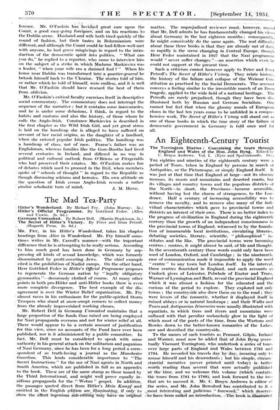The Mad Tea-Party Mn. FRY, in his Hiller's Wonderland, takes
his chapter
• headings from Alice in Wonderland. Mr. Fry himself some- times writes in Mr. Carroll's manner—with the important difference that he is attempting to be really serious. According `to him much good has been done in Germany by sup- pressing all kinds of sexual knowledge, which was formerly disseminated by profit-coveting Jews. The chief example cited is the prohibition of Nudist camps. On the other hand, Herr Gottfried Feder in Hitler's Official Programme proposes to regenerate the German nation by " legally obligatory gymnastics "—decorously clothed of course. At many other points in both pro-Hitler and anti-Hitler books there is even more complete divergence. The best example of the dis- agreement is over the Winter Relief organization. Mr. Fry- almost raves in his enthusiasm for the public-spirited Storm Troopers who stand at snow-swept corners to collect money from the already impoverished working classes.
Mr. Robert Dell in Germany Unmasked maintains that a large proportion of the funds thus raised are being employed for Nazi propaganda overseas and not for winter relief at all.
There would appear to be a certain amount of justification for this view, since no accounts of the Fund have ever been published, nor is it administered by a public committee. In fact, Mr. Dell - must - be considered to -speak with some authority in his general attack on the militarism and paganism of Nazi Germany, since he has been for a long period a corre- spondent of so truth-loving a journal as the Manchester Guardian. This lends considerable importance to "The Secret Instructions " for the use of Nazi agents in North and South America, which are published in full as an appendix
to the book. These are of the same stamp as those issued by- the Third International, and might well prove equally in-
sidious propaganda for the " Wotan " gospel. In addition,
the passages quoted direct from Hitler's Mein Kampf and , omitted in. the English edition are illuminating, if only to -show the 'effect- ingenious nub-editing lui+e'dn original
matter. The unprejudiced reviewer must, however; record that Mr. Dell admits he has fundamentally changed his views about Germany in the last eighteen months ; consequently, tie might conceivably do the same again. The real difficulty about these three books is that they are already out of date, so rapidly is the scene changing in Central Europe, though Herr Feder maintained in 1927 that the Nazi programme would " never suffer changes "—an assertion which even he
f •
could not support at the present time.
Such a criticism cannot however apply to Peter and Irma Petroff's The Secret of Hitler's Victory. They relate history, the history of the failure and collapse of Abe Weimar Con- stitution as practised by the Social Democrats. The account conveys a feeling similar to the irresistible march of an Ibsen tragedy, applied-to thewide.field Of a national heritage. The Petroffs are rarely prejudiced, though they have been dis- illusioned both by Russian and German Socialism. One cannot but feel that when the gloomy annals of European chaos in the last ten years come to be unfolded in a compre- hensive work, The Secret of Hitler's Victory will stand out as one of those books in which the true story of the failure of democratic government in Germany is told once and for all.










































 Previous page
Previous page